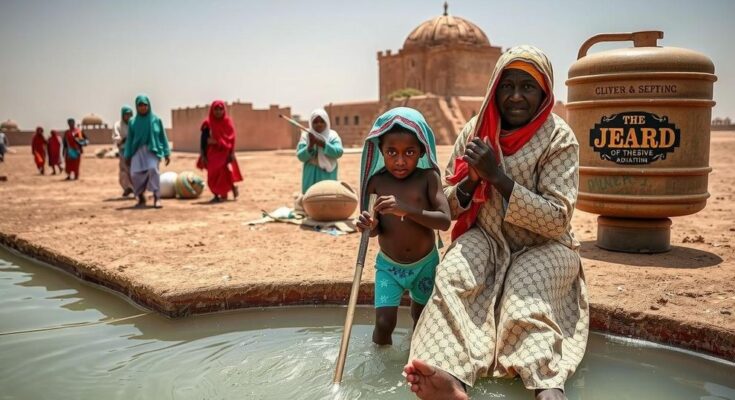Sudanese refugees in Chad are facing a severe water crisis in the Tanqori camp, exacerbating their suffering. Many, including Aisha Adam Ishaq, rely on contaminated water sources, as they receive insufficient daily water supplies. Authorities have relocated refugees from other camps, compounding challenges as tensions rise between local communities and displaced individuals. The UNHCR has called for urgent aid for the over 600,000 Sudanese refugees in Chad, whose living conditions continue to decline rapidly.
In a dire and worsening humanitarian crisis, Sudanese refugees in Chad are facing severe water scarcity that exacerbates their suffering. Aisha Adam Ishaq, who fled from El Geneina in West Darfur amid escalating violence, now finds herself in the Tanqori refugee camp, struggling with a mere 16 liters of water per day. This insufficient supply compels her and fellow refugees to resort to contaminated sources such as sewers.
Chadian authorities recently relocated these refugees from the Adri camp to Tanqori, which offers fewer essential services. There, thousands of displaced individuals are contending with significant shortages of clean water, food, and medical care. Despite initial resistance to the move due to fears concerning safety and resource availability, many were forcibly relocated. As a result, tensions have erupted between the refugees and local communities, further complicating the situation.
Fatima Adam Idris, another refugee, expressed the principal challenges faced in the camp: “There are no services in Tanqori camp. For 12 months, we have carried water on our heads, and we cannot endure this any longer. We need water, food, blankets, and clothes, especially now that it is winter.” The urgency of aid has been emphasized by the UNHCR, which noted that Chad is home to over 600,000 Sudanese refugees, many of whom have fled the violence of the Darfur conflict. The humanitarian conditions are critical and require immediate attention to prevent further deterioration of the health and safety of these vulnerable populations.
The humanitarian crisis in Chad is largely the result of ongoing conflict and instability in Sudan, particularly in the Darfur region. The 2003 conflict between the Sudanese government and various armed groups has led to mass displacement, with many seeking refuge in neighboring Chad. The current crisis is compounded by recent violence erupting in April 2023, which has prompted another wave of refugees seeking safety. Refugee conditions in camps such as Tanqori are dire, with inadequate access to clean water and essential services like medical care. These issues have intensified as authorities relocate refugees to remote areas, often without adequate planning or resources to support their needs. Humanitarian organizations have generally been absent in these areas, increasing risks of starvation and disease among displaced populations.
The situation for Sudanese refugees in Chad, particularly in the Tanqori camp, is dire, marked by an acute lack of clean water and necessary resources. With thousands displaced by violence and conflict, inadequate humanitarian assistance risks further suffering. Interventions are critically needed to address these shortages, as the health and wellbeing of these vulnerable populations hangs in the balance. The testimonies from refugees clearly indicate the urgent need for action and assistance.
Original Source: sudantribune.com




